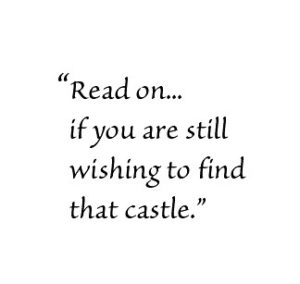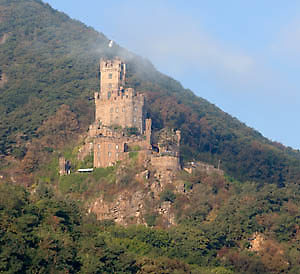I have your attention. Indulge me for a minute or two, and you may discover a secret to own a castle. What do you put most of your attention during the day? Dangling prepositions? Everyday we trust that we have our basic needs met. Like our heart beat, for example. Suddenly awakened at 3 am with chest pain, you might decide that a heart attack was really happening, as happened to me.
We see what attracts our attention. On a tropical vacation with warm scented breezes and a cool drink in hand, everything is fine. On a hot day while hiking on Mt Diablo close to Walnut Creek, California, I suffered heat exhaustion. That took away any sense of comfort or stability. When that happens, it is the most important thing there is. Yet when something important to us is out of sight, it can have a deep impact on our lives, even if it hasn’t become apparent yet.
Feel free to read on, if you are not distracted by a different butterfly drawing your attention, or if you are still wishing to find that castle.
 The ancient Romans developed intricate systems for water to come to their citizens, with the best metal pipes for the best citizens. After some centuries, these privileged citizens weren’t able to have children and didn’t know why. Now we know it was because they had lead pipes for their water. Moving beyond that ancient viewpoint, we have learned something more useful about the wisdom of Rome.
The ancient Romans developed intricate systems for water to come to their citizens, with the best metal pipes for the best citizens. After some centuries, these privileged citizens weren’t able to have children and didn’t know why. Now we know it was because they had lead pipes for their water. Moving beyond that ancient viewpoint, we have learned something more useful about the wisdom of Rome.
We can also gain something from history, when information is newly discovered. While researching ways around antibiotic resistant strains of bacteria we now have, a researcher found a treatment notation in an ancient book from the year 900 CE, yes 900. The treatment is a formula for a fermented brew, similar to the process of making beer to cure ills they knew of the time. This ancient formula has now proven effective in several lab tests to kill around 90% of the antibiotic resistant bacteria we now have. The researchers initially couldn’t believe the results, yet are confirming the results in retesting.
This gives us a perspective about learning about our wonderful, living world. That is our privilege as a part of the whole of the living organism of life and ability to act accordingly. There is no fixed-in-stone governing knowledge that guides life forever.
So now I will change the original statement. “How to have your own castle” may be a better stated as “How to have a castle we can live in”. As the 20th Century has taught us, hubris about our ability to change our world through chemistry and insecticides such as DDT leads us into the 21st Century with a new appreciation of this powerful perspective and appreciation for a balance that we strive for to continue to live here.
Most of us don’t spend our day thinking about a lack of food. Corporate food production has produced a new abundance. Corporate designs of modern foods have also produced a rising percentage of obese people in less than 50 years time. There is a growing awareness that more natural foods may lead to longer and more pleasant lives than the engineered food products of the corporate food industry. Most children now do not think about chicken as an animal with feathers when it appears on their plate. It comes in nuggets, or at least well wrapped in clear plastic on a plastic supermarket tray, sanitary and processed for us. My grandparents had a farm where chickens roamed and became dinner in the space of 2 hours and 20 paces, from barnyard to table.
What are the things we don’t think about, yet can not live without? Are you hot or cold? Does the air smell fine to you? Over one thousand people died from just being too hot last summer in India. Not many people you may say, given the size of India. If you are one of those thousand people, it might seem more significant. I personally have had heat exhaustion on a hot, summer hike. It causes unconsciousness and severe bodily reactions, taking away any sense of balance, safety or personal opinions. Of course cold is equally to be respected. Growing up in the midwest, I remember winters could be remarkably cold causing shivering to keep me warm.
Malcolm Gladwell, the author of the book “Collapse”, wrote about several notable events of man’s history on earth, how societies disappeared through their own rigid belief systems and ignored events happening around them. His example that I remember best is of the Norse people who moved into southern Greenland to settle and build communities in that new land. It was similar to their homelands, so they imported the same animals and methods of farming to begin there. What they did not pay attention to were the results of their efforts which were not working as they had before. They continued to believe that their way would prevail. The end result was that they all died, with the only distinction being that the richest of them died last, living in the best castle like homes. This in spite of the native Inuit people who were also living there, but in a very different way than the Norse, who still insisted on living as they wished. Ignoring the signs of their mistakes gave them no future.
Knowledge is beneficial as we move swiftly ahead. History can be a great teacher, and real evidence of how the supportive natural world is moving alongside our efforts. This can give us the wonder of our own personal castles on our home, this earth.
